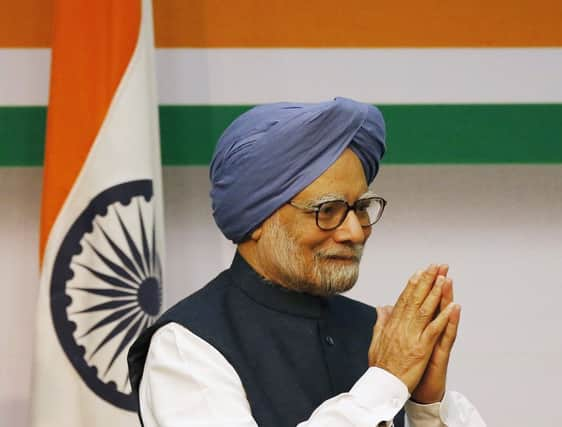Indian leader Singh to step down after elections


In only his third news conference in a decade, prime minister Manmohan Singh said that Mr Gandhi – the 43-year-old heir to India’s Nehru-Gandhi political dynasty – has the best credentials to become the next head of the Congress Party and prime minister of the world’s biggest democracy.
Mr Singh is 81 and was not expected to seek another term. “I have ruled myself out as a prime ministerial candidate,” he said. “Rahul Gandhi has outstanding credentials. I do hope the party will take the right decision at the appropriate time.”
Advertisement
Hide AdAdvertisement
Hide AdYesterday’s news conference came as the Congress Party’s stock was low, battered by corruption scandals, internal feuding, and an inability to deal with a faltering economy and deep-rooted problems with poverty, infrastructure and education.
The opposition Bharatiya Janata Party (BJP), led by Narendra Modi, has the momentum ahead of the May elections, after beating the Congress Party in recent state polls. The vote was seen as a gauge of voter sentiment in the secular country of 1.2 billion.
Mr Singh said it would be disastrous if Mr Modi became prime minister.
Mr Modi, chief minister of western Gujarat state for the past 11 years, is credited with turning his state into an industrial haven. But critics question whether the Hindu nationalist chief can be a truly secular leader over India’s many cultures.
Mr Modi has been accused of doing little to stop anti-Muslim riots in the state in 2002, which left more than 1,000 people, mostly Muslims, dead.
Mr Singh said: “Without discussing the merits of Modi, it would be disastrous for the country to have Narendra Modi as the next prime minister.”
Asked about BJP claims that he was a “weak” prime minister, Mr Singh said: “If by a strong prime minister they mean you preside over the massacre of innocent citizens on the streets of Ahmadabad [the commercial centre of Gujarat], if that is the measure of strength, I do not believe that is the sort of strength this country needs, least of all from its prime minister.”
Mr Modi has denied any role in the violence and says he bears no responsibility for the killings.
Advertisement
Hide AdAdvertisement
Hide AdLast month, he said that he had been “shaken to the core” by the violence and that his government responded to it swiftly and decisively.
The BJP was quick to hit back yesterday, saying that with corruption scandals erupting around the government, the prime minister was in no position to criticise Mr Modi.
Ravi Shankar Prasad, a BJP leader, claimed Mr Singh brought “agony and misery to the country and its people because of his shameful governance. He said: “You are nobody to call [Modi] a disaster.”
Mr Singh, a technocrat, was chosen to fill the prime minister’s seat in 2004 by Sonia Gandhi, the widow of assassinated prime minister Rajiv Gandhi. But he has been widely seen as a regent, keeping the seat warm until Rahul Gandhi was ready to take what some see as his birthright.